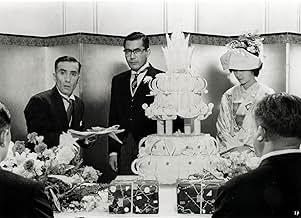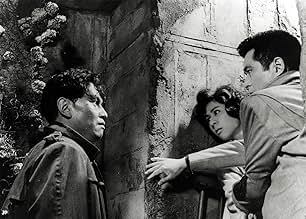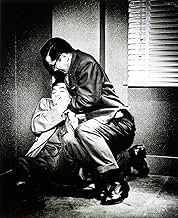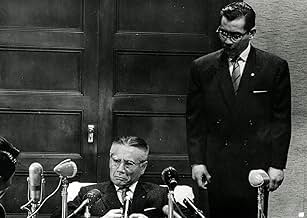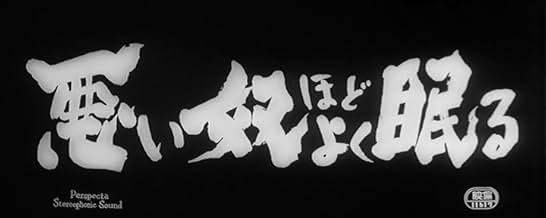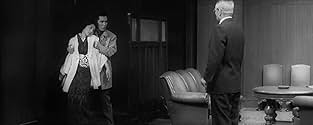IMDb रेटिंग
8.0/10
15 हज़ार
आपकी रेटिंग
अपनी भाषा में प्लॉट जोड़ेंA vengeful young man marries the daughter of a corrupt industrialist in order to seek justice for his father's suicide.A vengeful young man marries the daughter of a corrupt industrialist in order to seek justice for his father's suicide.A vengeful young man marries the daughter of a corrupt industrialist in order to seek justice for his father's suicide.
- पुरस्कार
- 3 जीत और कुल 1 नामांकन
फ़ीचर्ड समीक्षाएं
"The Bad Sleep Well" is Akira Kurosawa's second handling of the film noir genre after "Stray Dog" in 1949 and three years before "High and Low" in 1963. These two films were gripping documentary-like police procedurals. In contrast, "The Bad Sleep Well", with its intriguing title and loosely Hamletian undertones, shows the way these procedurals can be made useless by the sheer power of bureaucratic Omerta... and I'm not using the word in vain.
The film is perhaps the most noirish of the three in its vitriolic depiction of corporate corruption, showing us the other side of modern Japan's coin where hierarchy governs not most but all of its institutions, family included. In fact, what the film accomplishes through the precise and uncompromising eye of Kurosawa's camera and a tight (if not somewhat tedious) script, reminds me of a classic among the classics: "The Godfather" and Coppola must have loved "The Bad Sleep Well".
The film is about a bunch of corporate executives in the Construction and Land Development business using their influence, wealth and occasionally disguised threats to hide a kickback scheme that occurred seven years ago. There's the Vice President Iwabushi, the Administrative Officer Moriyama, the Assistant-to-the-Chief Wada, the Contract Officer Shirai, each man representing a stratus protecting the upper layer from collapsing the higher you are, the safer you get, which plays exactly like the Mafia vertical organization with soldiers and "buffers" ... some execute and some are executed. The bad indeed sleep well.
"Ikiru", which is certainly Kurosawa's most acclaimed modern movie, hid behind its existential message an assertive comment against public bureaucracy. "The Bad Sleep Well" goes even further by subverting the clichés about Japanese's discipline with some employees going as far as sacrificing their lives. There's a moment where the accountant receives a message that says grossly "we'll take care of you, everything will be all right", and then he ultimately throws himself under a passing bus.
It's not often that you have two "Godfather" references in one, the message reminded me of the last talk between Tom Hagen and Frank Pentangeli in "Part II" and the sound of the truck coming with the close-up on the ma n's" face echoed the climax of the restaurant scene. And if the "Godfather" trilogy was about gangsters posing as respectable men, "The Bad Sleep Well" is about respectable men acting like gangsters. And I'm not done with the comparisons, the most notable one is the opening sequence with a wedding that makes the exposition elements flow without feeling too forced.
Snarky reporters are covering the wedding between the daughter of Iwabushi, played by Masayuki Mori (I couldn't believe it was 9 years after his youthful appearance in "The Idiot") and Nishi, a quiet and discreet secretary played by Toshiro Mifune. The girl has a lump and rumor has it that Nishi married her out of interests (they're half right actually). And so the wedding allows us to place names in face and a few incidents set up the action: an untimely arrest, Ibawushi's son Tatsuo (Tatsuya Mihashi) makes a speech where he threatens to kill Nishi if he ruins his sister's life but the icing of a cake is the wedding cake itself. In place of the real one, a cake representing the company's building is served, a rose placed in the seventh floor from which an employee jumped to his death, ending an investigation for corruption. "This marks the end of a one-act play," says a reporter "are you kidding?", retorts his colleague, "this is only a prologue".
And so the prologue ends and the action takes off through a series of incidents suggesting that there's a mole in the company who know about the events that occurred seven year ago, who ordered the cake to send a message and who's up to something. The film features one of the most elaborate schemes, a strategy of destruction whose many tactics include the disguise of Wada's disappearance into suicide. In a later scene, the man is allowed to assist his own funeral and hear his employees gloating at his death. Shirai is then gaslighted to the point that you almost feel sorry for him. Finally, Moyamari (Takashi Shimura) is forced to reveal where the dirty money by simply being starved. I had often wondered why no one thought of extorting money with a simple glass of water, glad a film thought of it.
Of course, it doesn't take long to reveal the perpetrator of all these actions, but more importantly his motive. It's obviously Nishi, the central protagonist, and it's easy to make the parallel with the seventh floor's death and his thirst for revenge but the best thing about the film is how conflicted Nishi is. He has obviously married the daughter to approach a man who is his enemy and with time, his sentiments grow. Moreover, even Wada starts to empathize with his actions and advise him against not becoming like the men he fight. The problem of Nishi is that his actions destroy the father of a person he cares for and ironically turns him into a character who, if not morally bad, uses the same tools than his enemies. It doesn't make him worse but his own morality is put in the film's equation.
Nishi's playful whistling is the film's musical leitmotif, suggesting that he's "enjoying" what he does to a limit. We do "enjoy" the way he toys with these serious men's sanity and sense of immunity and the film while two hours and half long, finds a way to draw us in Nishi's action. But the game stops near the third act, when his intentions are revealed, and the enemies fight back.
Now, I'm still puzzled by the ending, to the point I wondered whether it's the best or the worst thing about the film. One thing for sure, when it ended with that head being bowed and the title appeared, I was nodding mine.
The film is perhaps the most noirish of the three in its vitriolic depiction of corporate corruption, showing us the other side of modern Japan's coin where hierarchy governs not most but all of its institutions, family included. In fact, what the film accomplishes through the precise and uncompromising eye of Kurosawa's camera and a tight (if not somewhat tedious) script, reminds me of a classic among the classics: "The Godfather" and Coppola must have loved "The Bad Sleep Well".
The film is about a bunch of corporate executives in the Construction and Land Development business using their influence, wealth and occasionally disguised threats to hide a kickback scheme that occurred seven years ago. There's the Vice President Iwabushi, the Administrative Officer Moriyama, the Assistant-to-the-Chief Wada, the Contract Officer Shirai, each man representing a stratus protecting the upper layer from collapsing the higher you are, the safer you get, which plays exactly like the Mafia vertical organization with soldiers and "buffers" ... some execute and some are executed. The bad indeed sleep well.
"Ikiru", which is certainly Kurosawa's most acclaimed modern movie, hid behind its existential message an assertive comment against public bureaucracy. "The Bad Sleep Well" goes even further by subverting the clichés about Japanese's discipline with some employees going as far as sacrificing their lives. There's a moment where the accountant receives a message that says grossly "we'll take care of you, everything will be all right", and then he ultimately throws himself under a passing bus.
It's not often that you have two "Godfather" references in one, the message reminded me of the last talk between Tom Hagen and Frank Pentangeli in "Part II" and the sound of the truck coming with the close-up on the ma n's" face echoed the climax of the restaurant scene. And if the "Godfather" trilogy was about gangsters posing as respectable men, "The Bad Sleep Well" is about respectable men acting like gangsters. And I'm not done with the comparisons, the most notable one is the opening sequence with a wedding that makes the exposition elements flow without feeling too forced.
Snarky reporters are covering the wedding between the daughter of Iwabushi, played by Masayuki Mori (I couldn't believe it was 9 years after his youthful appearance in "The Idiot") and Nishi, a quiet and discreet secretary played by Toshiro Mifune. The girl has a lump and rumor has it that Nishi married her out of interests (they're half right actually). And so the wedding allows us to place names in face and a few incidents set up the action: an untimely arrest, Ibawushi's son Tatsuo (Tatsuya Mihashi) makes a speech where he threatens to kill Nishi if he ruins his sister's life but the icing of a cake is the wedding cake itself. In place of the real one, a cake representing the company's building is served, a rose placed in the seventh floor from which an employee jumped to his death, ending an investigation for corruption. "This marks the end of a one-act play," says a reporter "are you kidding?", retorts his colleague, "this is only a prologue".
And so the prologue ends and the action takes off through a series of incidents suggesting that there's a mole in the company who know about the events that occurred seven year ago, who ordered the cake to send a message and who's up to something. The film features one of the most elaborate schemes, a strategy of destruction whose many tactics include the disguise of Wada's disappearance into suicide. In a later scene, the man is allowed to assist his own funeral and hear his employees gloating at his death. Shirai is then gaslighted to the point that you almost feel sorry for him. Finally, Moyamari (Takashi Shimura) is forced to reveal where the dirty money by simply being starved. I had often wondered why no one thought of extorting money with a simple glass of water, glad a film thought of it.
Of course, it doesn't take long to reveal the perpetrator of all these actions, but more importantly his motive. It's obviously Nishi, the central protagonist, and it's easy to make the parallel with the seventh floor's death and his thirst for revenge but the best thing about the film is how conflicted Nishi is. He has obviously married the daughter to approach a man who is his enemy and with time, his sentiments grow. Moreover, even Wada starts to empathize with his actions and advise him against not becoming like the men he fight. The problem of Nishi is that his actions destroy the father of a person he cares for and ironically turns him into a character who, if not morally bad, uses the same tools than his enemies. It doesn't make him worse but his own morality is put in the film's equation.
Nishi's playful whistling is the film's musical leitmotif, suggesting that he's "enjoying" what he does to a limit. We do "enjoy" the way he toys with these serious men's sanity and sense of immunity and the film while two hours and half long, finds a way to draw us in Nishi's action. But the game stops near the third act, when his intentions are revealed, and the enemies fight back.
Now, I'm still puzzled by the ending, to the point I wondered whether it's the best or the worst thing about the film. One thing for sure, when it ended with that head being bowed and the title appeared, I was nodding mine.
10maurazos
I am watching Kurosawa's full collection and the more I watch, the more I love the art of "The Emperor". And unlike many Kurosawa's fans, my preferred films are those that talk about the time Kurosawa lived, not about the samurai ages. Again, Kurosawa uses the literature classics (for this film, Shakespeare's "Hamlet") as a source for his stories, proving that the subjects they talked about are still modern. Anyway, the genius of Kurosawa is quite big to make their film be not just a cinema remake of those texts, but an original, exciting plot. And again, Kurosawa gives us a film with a clear and worrying social message, a denounce to a serious problem (company and state corruption that even today still darkens the image of a "100% legal" Japan). A film to enjoy and film to learn about Japanese society and life in a general way.
"The Bad Sleep Well" is a forgotten gem from one of Japan's great masters, Akira Kurosawa. His other two Shakespeare adaptations, "Throne of Blood" (Macbeth) and "Ran" (King Lear), are much more famous and well-regarded, justifiably so if you have seen them ("Ran" is particular is my favorite of all Kurosawa films). However, this sharp and caustic adaptation of Hamlet deserves an equal amount of praise and recognition. It may be the most bleak subject matter that Kurosawa ever tackled - the corruption in the highest levels of government in post-war Japan.
The film begins with a long but funny wedding sequence that illustrates Kurosawa's great skill as a director. We (and the camera) are among a group of reporters discussing the numerous convenient reasons for the marriage; the bride is lame and the daughter of Iwabuchi, the head of corporation, and the bridegroom, Nishi, has aspirations to elevate his status in the business. We see the comedy of manners play out in this sequence in increasingly humorous situations as the various parties deny the rumors and reporters continue comment to each other, culminating in the panicked looks on the faces of the corporate higher-ups as the wedding cake arrives - in the shape of their office building, Public Corp., with a red X marking a spot in one of the windows where one of their former partners committed suicide. It's a virtuoso sequence that perfectly sets up the tone of the rest of the film.
The newspapers have a field day with this, especially when various members of Public Corp. are investigated for fraud and embezzlement, yet they stoically remain silent and the case goes nowhere. Then it heats up again as a few of them commit suicide; the rumors are that they were goaded into doing so (n fact, they were). However, without any substance to press the matter, the case is dropped. And that's when the real story begins - one of the Public Corp executives, Wada, survives and is rescued by Nishi and his shadowy accomplice, Itakura.
This is followed by a brilliant scene in which Wada is taken to his own funeral and observes the farce - all the while, Nishi plays him a tape with Moriyama and Shirai, his former partners, plotting his murder. The way Kurosawa stages this is masterful; the sublime music emanating from the funeral is contrasted dramatically with the cold-blooded words of Public Corp, as Wada listens on. One of the ways Wada contributes is to scare the living hell out of Shirai - Wada poses as a ghost of himself in order to freak him out (a clever method of adding in the ghost in Hamlet). As the plot progresses, Nishi reveals his reasons for saving Wada and exacting a very personal revenge on Iwabuchi and his cohorts; and the story's pace becomes more frantic and exciting with a dramatic but sudden conclusion.
Technically, Kurosawa is at his best here. The wedding and the funeral are both marvels of observational behavior and they contrast each other perfectly. He uses a lot of intriguing mise-en-scene compositions for his interiors that serve to highlight his characters' inner thoughts but very little movement of the camera in order to manipulate his audience; the dark nature of the story is enough to suck you in. One of the fascinating observations in "The Bad Sleep Well" is that nearly all of the characters are morally bankrupt and filled with secrets - even Nishi, the protagonist. His wife, the Ophelia character, is the only one that Kurosawa allows us to feel sympathy for, and even then in the end she is not fully spared her grief. Taken in this context, Kurosawa's Hamlet becomes a study in the morality and pragmatism of revenge but also an incisive jab at the fat cats in modern Japan.
If there is a flaw in the film, it is that the overall pacing is not always brisk enough to sustain the long running time (2 1/2 hours). The wedding, despite being absolutely essential, is protracted; the rest of the film is much quicker but still drags in parts. Also, Kurosawa seems unsure about his ending; the film ends quite abruptly but appropriately in terms of his larger point about the hopelessness of fighting the rampant corruption, I would argue. However, despite these flaws, overall "The Bad Sleep Well" is a masterful and dark excursion into the seedy side of corporate crime, using Shakespeare Hamlet brilliantly but not completely as it's core. Toshiro Mifune in particular gives one of his most unique low-key performances; instead of his usual fiery exterior we get a performance full of internalized anger throughout. Highly recommended.
The film begins with a long but funny wedding sequence that illustrates Kurosawa's great skill as a director. We (and the camera) are among a group of reporters discussing the numerous convenient reasons for the marriage; the bride is lame and the daughter of Iwabuchi, the head of corporation, and the bridegroom, Nishi, has aspirations to elevate his status in the business. We see the comedy of manners play out in this sequence in increasingly humorous situations as the various parties deny the rumors and reporters continue comment to each other, culminating in the panicked looks on the faces of the corporate higher-ups as the wedding cake arrives - in the shape of their office building, Public Corp., with a red X marking a spot in one of the windows where one of their former partners committed suicide. It's a virtuoso sequence that perfectly sets up the tone of the rest of the film.
The newspapers have a field day with this, especially when various members of Public Corp. are investigated for fraud and embezzlement, yet they stoically remain silent and the case goes nowhere. Then it heats up again as a few of them commit suicide; the rumors are that they were goaded into doing so (n fact, they were). However, without any substance to press the matter, the case is dropped. And that's when the real story begins - one of the Public Corp executives, Wada, survives and is rescued by Nishi and his shadowy accomplice, Itakura.
This is followed by a brilliant scene in which Wada is taken to his own funeral and observes the farce - all the while, Nishi plays him a tape with Moriyama and Shirai, his former partners, plotting his murder. The way Kurosawa stages this is masterful; the sublime music emanating from the funeral is contrasted dramatically with the cold-blooded words of Public Corp, as Wada listens on. One of the ways Wada contributes is to scare the living hell out of Shirai - Wada poses as a ghost of himself in order to freak him out (a clever method of adding in the ghost in Hamlet). As the plot progresses, Nishi reveals his reasons for saving Wada and exacting a very personal revenge on Iwabuchi and his cohorts; and the story's pace becomes more frantic and exciting with a dramatic but sudden conclusion.
Technically, Kurosawa is at his best here. The wedding and the funeral are both marvels of observational behavior and they contrast each other perfectly. He uses a lot of intriguing mise-en-scene compositions for his interiors that serve to highlight his characters' inner thoughts but very little movement of the camera in order to manipulate his audience; the dark nature of the story is enough to suck you in. One of the fascinating observations in "The Bad Sleep Well" is that nearly all of the characters are morally bankrupt and filled with secrets - even Nishi, the protagonist. His wife, the Ophelia character, is the only one that Kurosawa allows us to feel sympathy for, and even then in the end she is not fully spared her grief. Taken in this context, Kurosawa's Hamlet becomes a study in the morality and pragmatism of revenge but also an incisive jab at the fat cats in modern Japan.
If there is a flaw in the film, it is that the overall pacing is not always brisk enough to sustain the long running time (2 1/2 hours). The wedding, despite being absolutely essential, is protracted; the rest of the film is much quicker but still drags in parts. Also, Kurosawa seems unsure about his ending; the film ends quite abruptly but appropriately in terms of his larger point about the hopelessness of fighting the rampant corruption, I would argue. However, despite these flaws, overall "The Bad Sleep Well" is a masterful and dark excursion into the seedy side of corporate crime, using Shakespeare Hamlet brilliantly but not completely as it's core. Toshiro Mifune in particular gives one of his most unique low-key performances; instead of his usual fiery exterior we get a performance full of internalized anger throughout. Highly recommended.
Akira Kurosawa's "The Bad Sleep Well" is too dense and frankly too slow a film to qualify as a thriller in the usual sense. Although the elements are there - intrigue, double crosses, revenge, and crimes both naked and invisible - the pacing is too deliberate and there is little real suspense.
Yes, it's "Hamlet," though in a subtle, understated, Japanese way. Some of the characters are left out, but you'll eventually spot the Prince, Horatio, Ophelia, and Claudius. However, unlike his "Macbeth" ("Throne of Blood"), this is only a partial transposition and Kurosawa wisely does not carry the parallels too far.
Although it takes patience, the picture has its rewards. The performances are good, especially Masayuki Mori as the reptilian manipulator Iwabuchi, Kamatari Fujiwara as the hapless accountant Wada, and, as always, Takashi Shimura as master bureaucrat Moriyama. The sharp black-and-white cinematography gives the film a photo-journal aura of authenticity. And Masaru Sato's wonderful opening theme, heavy with menace and unease, certainly sets an appropriate tone.
Toshiro Mifune as Nishi/Hamlet is unusually restrained here, his normal fire largely internalized. He's adequate, but this casting against type doesn't really suit him.
"The Bad Sleep Well" is Kurosawa's attack on Japan's post-war business corruption that apparently was endemic by 1960 and perhaps still is today. His critique is harsh and unsparing, though one can't help but get the feeling that he's shooting at fish in a barrel.
Beyond the corruption of the corporate scandal, which the film literally headlines, is a strong sense of inner decay. Nearly everyone, regardless of their position, is uncomfortable. Even Iwabuchi, for all his power, must answer awkwardly to greater, unseen forces. Only the jackal-journalists who cover the opening wedding banquet seem immune to the pervasive uneasiness.
Yet all, save Nishi, are prepared to accept this state of affairs in return for their security. Ironically, Nishi himself seems most comfortable in an old air raid shelter in the ruins of a munitions plant, his own "castle", as it were, where he fights for honor as he understands it.
Recommended for Kurosawa fans and anyone interested in Japanese psyche, culture, or style. Those expecting a slam-bang 1940s Warner Brothers treatment will be extremely disappointed and probably won't last an hour.
Yes, it's "Hamlet," though in a subtle, understated, Japanese way. Some of the characters are left out, but you'll eventually spot the Prince, Horatio, Ophelia, and Claudius. However, unlike his "Macbeth" ("Throne of Blood"), this is only a partial transposition and Kurosawa wisely does not carry the parallels too far.
Although it takes patience, the picture has its rewards. The performances are good, especially Masayuki Mori as the reptilian manipulator Iwabuchi, Kamatari Fujiwara as the hapless accountant Wada, and, as always, Takashi Shimura as master bureaucrat Moriyama. The sharp black-and-white cinematography gives the film a photo-journal aura of authenticity. And Masaru Sato's wonderful opening theme, heavy with menace and unease, certainly sets an appropriate tone.
Toshiro Mifune as Nishi/Hamlet is unusually restrained here, his normal fire largely internalized. He's adequate, but this casting against type doesn't really suit him.
"The Bad Sleep Well" is Kurosawa's attack on Japan's post-war business corruption that apparently was endemic by 1960 and perhaps still is today. His critique is harsh and unsparing, though one can't help but get the feeling that he's shooting at fish in a barrel.
Beyond the corruption of the corporate scandal, which the film literally headlines, is a strong sense of inner decay. Nearly everyone, regardless of their position, is uncomfortable. Even Iwabuchi, for all his power, must answer awkwardly to greater, unseen forces. Only the jackal-journalists who cover the opening wedding banquet seem immune to the pervasive uneasiness.
Yet all, save Nishi, are prepared to accept this state of affairs in return for their security. Ironically, Nishi himself seems most comfortable in an old air raid shelter in the ruins of a munitions plant, his own "castle", as it were, where he fights for honor as he understands it.
Recommended for Kurosawa fans and anyone interested in Japanese psyche, culture, or style. Those expecting a slam-bang 1940s Warner Brothers treatment will be extremely disappointed and probably won't last an hour.
The Bad Sleep Well is one of the best revenge movies of all time. It stars the great Toshiro Mifune as a man seeking revenge against the people who forced his father into committing suicide. Unlike many revenge movies, The Bad Sleep Well doesn't glamorize its subject. Instead it shows how in trying to get retribution for a man who is now dead, Mifune ends up injuring himself and other people he loves who are still alive. There are a lot of beautiful and haunting images, like when we see a desperate man struggling to climb a volcano so he can throw himself in, or a number of scenes that are shot at the bombed out wreckage of an old WWII munitions plant. The bleak landscape mirrors the damaged lives of the movie's characters. Powerful and haunting, this is a movie that will follow you for days.
क्या आपको पता है
- ट्रिवियाThe ideas for the film came from Akira Kurosawa's nephew, Mike Y. Inoue, who wanted to be a scriptwriter and was giving his scripts to his uncle. Kurosawa liked it and made suggestions, to which Inoue spent six months rewriting the script under the title "Bad Men's Prosperity." Kurosawa, along with several others, reworked it even more into the final version, though Inoue did not receive screen credit.
- गूफ़When Nishi is trying to push Shirai out of the window, the brick wall outside of the window moves around - a lot.
- भाव
Koichi Nishi: It's not easy hating evil. You have to stoke your own fury until you become evil yourself.
- इसके अलावा अन्य वर्जनOriginally released at 151 in Japan; USA version removes 16 minutes of footage.
- कनेक्शनFeatured in WatchMojo: Top 10 Movies You Didn't Know Borrowed from Shakespeare (2016)
- साउंडट्रैकBridal Chorus
(uncredited)
from "Lohengrin"
Music by Richard Wagner
Played at the end of the wedding ceremony
टॉप पसंद
रेटिंग देने के लिए साइन-इन करें और वैयक्तिकृत सुझावों के लिए वॉचलिस्ट करें
- How long is The Bad Sleep Well?Alexa द्वारा संचालित
विवरण
- रिलीज़ की तारीख़
- कंट्री ऑफ़ ओरिजिन
- भाषा
- इस रूप में भी जाना जाता है
- The Bad Sleep Well
- फ़िल्माने की जगहें
- Aso Kuju National Park, Kyushu, जापान(volcanic area)
- उत्पादन कंपनियां
- IMDbPro पर और कंपनी क्रेडिट देखें
बॉक्स ऑफ़िस
- बजट
- JP¥8,25,40,000(अनुमानित)
- US और कनाडा में सकल
- $46,808
- US और कनाडा में पहले सप्ताह में कुल कमाई
- $15,942
- 28 जुल॰ 2002
- दुनिया भर में सकल
- $47,023
- चलने की अवधि2 घंटे 31 मिनट
- रंग
- पक्ष अनुपात
- 2.35 : 1
इस पेज में योगदान दें
किसी बदलाव का सुझाव दें या अनुपलब्ध कॉन्टेंट जोड़ें

टॉप गैप
By what name was Warui yatsu hodo yoku nemuru (1960) officially released in India in English?
जवाब

